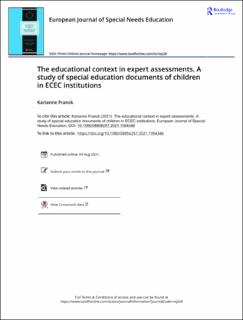The educational context in expert assessments. A study of special education documents of children in ECEC institutions
Peer reviewed, Journal article
Published version

Permanent lenke
https://hdl.handle.net/11250/2770543Utgivelsesdato
2021-08Metadata
Vis full innførselSamlinger
- Artikler (Articles) [173]
- Publikasjoner fra Cristin - DMMH [138]
Originalversjon
European Journal of Special Needs Education. 2021, 1-15. 10.1080/08856257.2021.1954346Sammendrag
The aim of this study was to critically examine how expert assessment documents describe and assess the early childhood education and care (ECEC) context in reports about a child’s need for special educational support. Adhering to a shift towards inclusive education, the focus is on how educational-psychological services assess, or fail to assess for, potential shortcomings in the educational environment. The study is based on in-depth document-analysis of 23 expert assessments of children with 1–10 weekly hours of special educational support in various ECEC institutions in Norway. The analysis outlines five different ways in which expert assessments refer to the educational context: from concealing, separating, situating the child in, accentuating, to critically assessing the ECEC context. The results illustrate how assessments at times refer to the ECEC context in, for example, descriptions of a child’s behaviour during routine activities or providing information about the institutions organisational qualities and practices. However, the documents hardly ever discuss potential shortcomings of the ECEC context.
